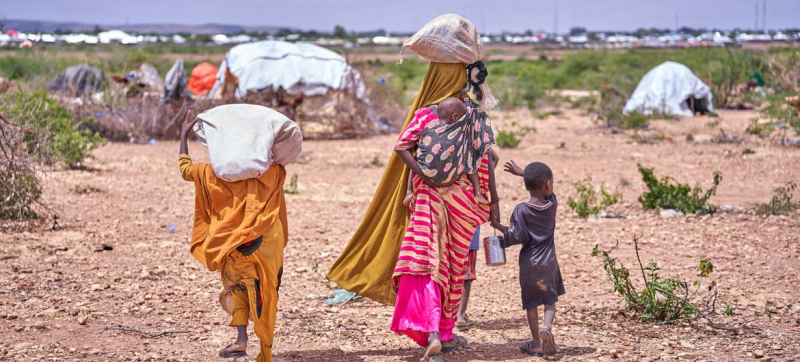- Israel Strikes Tehran with US Support Amid Nuclear Tensions |
- India Sees 9% Drop in Foreign Tourists as Bangladesh Visits Plunge |
- Dhaka Urges Restraint in Pakistan-Afghan War |
- Guterres Urges Action on Safe Migration Pact |
- OpenAI Raises $110B in Amazon-Led Funding |
Violence in Somalia, Cholera in Haiti, UN Tax Experts Named

A mother and her children carry their remaining belongings and search for a place to take shelter following flooding in Hiran, Hirshabelle state, Somalia, in 2024. (file)
Ongoing violence has displaced more than 100,000 people in two regions of Somalia over the past two months, the UN Office for the Coordination of Humanitarian Affairs (OCHA) reported on Wednesday.
Clashes intensified in the town of Mahas in the Hiraan region, Hirshabelle State, on 26 July, forcing the entire population—over 28,000 people—to flee their homes.
Another 38,000 people were displaced in the Gedo region, Jubaland State, between 23 and 26 July, with some crossing into Kenya.
Security concerns have forced seven health facilities in the Hiraan region to suspend operations, leaving thousands without essential healthcare and emergency services. Humanitarian access is also restricted, particularly in hard-to-reach areas.
OCHA noted that only a limited number of aid partners can operate in these locations due to insecurity and financial constraints. Affected communities urgently need shelter, food, clean water, healthcare, and protection.
This crisis is unfolding as aid agencies grapple with severe funding cuts. A $1.4 billion humanitarian plan for Somalia in 2024 is only around 16 per cent funded, with $229 million received so far.
Cholera continues to strain Haiti’s fragile public health system, especially in displacement sites with limited access to safe water and sanitation.
The country faces multiple political, security, and socio-economic crises, including rampant gang violence in the capital, Port-au-Prince.
The UN World Health Organization (WHO) reported 34 new suspected cholera cases between 13 and 19 July across six of the country’s 10 departments, most linked to displacement sites.
Five active transmission hotspots have been identified, including Port-au-Prince and northern areas.
Since December 2024, over 2,800 suspected cases have been reported, including 91 confirmed cases and 36 deaths.
Despite funding shortfalls, UN humanitarian partners are carrying out key cholera prevention and response activities. In the Artibonite department, families received water purification tablets and oral rehydration salts, while in central Haiti, handwashing stations were installed and community outreach efforts intensified.
UN Secretary-General António Guterres has appointed 25 experts to the UN Committee of Experts on International Cooperation in Tax Matters to help countries design tax policies that support their social, environmental, and economic development goals.
The committee supports governments in navigating complex policy trade-offs, offering practical tools based on global tax systems and real-world experiences.
The newly appointed members, who will serve from 2025 to 2029, have diverse expertise in tax policy and administration. They represent a wide range of regions and tax systems. A majority are women, reflecting the UN’s commitment to inclusivity in tax leadership.

